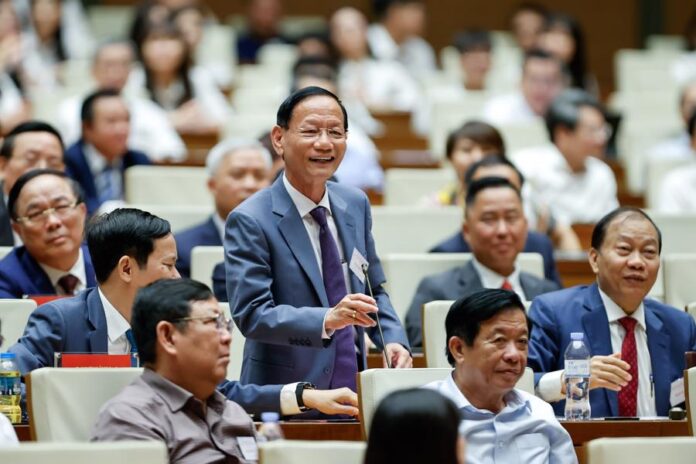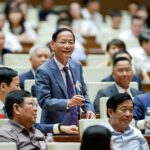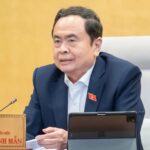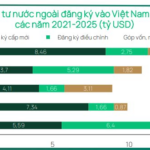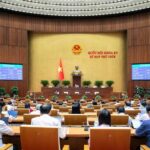This dialogue and Q&A session was not part of the initial conference program, but it was organized in the Diên Hồng Hall of the National Assembly, in the presence of the highest-ranking leaders of the Party and the State: General Secretary Tô Lâm, President Lương Cường, Prime Minister Phạm Minh Chính, and Chairman of the National Assembly Trần Thanh Mẫn. The exchange showcased a very open spirit and the special attention of the Party and State to the private sector, in line with Resolution 68.
After presenting the key and core contents of Resolution 68, at the request of the organizers, Prime Minister Phạm Minh Chính asked the delegates if they had any comments on what he had presented.
Encouraged by the Prime Minister, businessman Vũ Văn Tiền, Chairman of the Board of Directors of Geleximco Group, was the first to stand up amid applause from the entire hall.
Sharing his thoughts on Resolution 68, Mr. Tiền expressed that the Resolution’s determination that “the private sector is the most important driving force of the national economy” is a strategic and breakthrough change with an overarching vision. It accurately assesses the position and role of the private sector and thoroughly eliminates prejudices and negative perceptions toward private enterprises.
“We believe that this is a comprehensive revolution, a liberation for the private sector—like a drought finally meeting a downpour, which we private enterprises have long awaited. Many issues frustrated us, and we wanted to contribute but couldn’t, often feeling restrained,” said Mr. Tiền, calling for a response from the business community.
To ensure effective implementation, he proposed assigning an agency to evaluate the compliance and execution of the Resolution by ministries, agencies, and localities and to receive feedback from the people and businesses during the process.
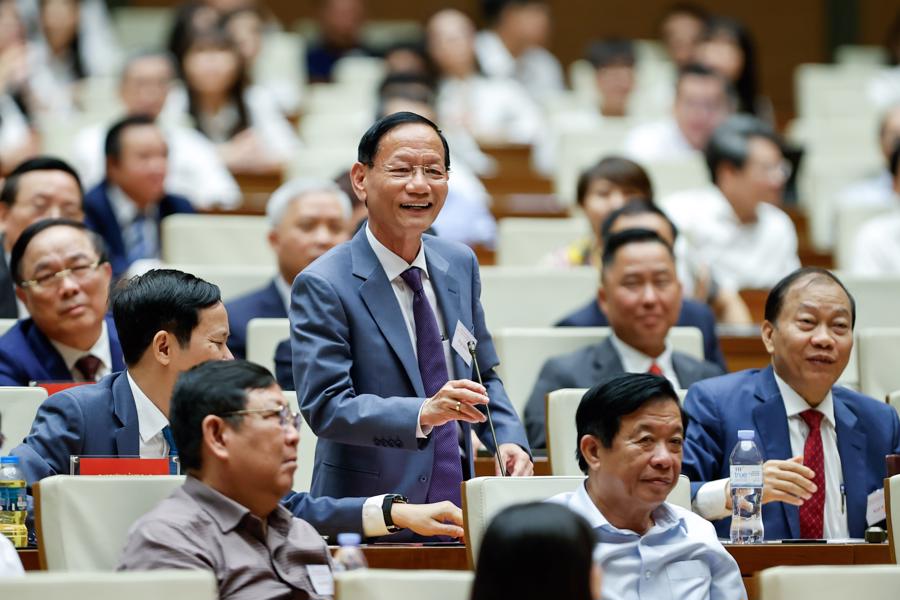
Regarding this issue, Prime Minister Phạm Minh Chính stated that Resolution 68 of the Politburo, Resolution No. 198/2025/QH15 dated May 17, 2025, of the National Assembly on special mechanisms and policies to develop the private sector, and the Government’s Action Plan to implement Resolution 68-NQ/TW of the Politburo and the Government’s Deployment Plan for Resolution 198/2025/QH15 of the National Assembly have already assigned very specific tasks to agencies for implementation.
During the implementation process, a continuous review and summary of the implementation of previous resolutions will be conducted, building on the positive aspects and addressing the shortcomings. The Prime Minister emphasized that, previously, everything had to go through a bidding process, but now, a significant aspect of Resolution 68 is the assignment of tasks and orders to enterprises. Therefore, he expects enterprises to “keep their promises and turn commitments into tangible products and measurable results,” and the same is expected of government agencies.
The Prime Minister suggested that agencies and localities take into account the opinions and sentiments of entrepreneurs to improve their performance. During the implementation process, they should learn and make gradual improvements without striving for perfection or rushing.
The second entrepreneur to question the Prime Minister was Mr. Đặng Hồng Anh, Chairman of the Young Entrepreneurs Association of Vietnam. He asked about the government’s plan to digitize data on legal regulations and the progress of legal resolution, making it easier for entrepreneurs to access this information.
In response, the Prime Minister shared that he had assigned the Minister of Justice to develop a Digital Legal Portal to facilitate enterprises’ and entrepreneurs’ access to the Party’s guidelines and the State’s policies and laws. This portal will also enable entrepreneurs and enterprises to contribute to the development and improvement of the institutional system and reflect on any difficulties in implementing Resolution 68 of the Politburo and the resolutions of the National Assembly and the Government. This will save time and costs for businesses and reduce the need for physical meetings and consultations with agencies.
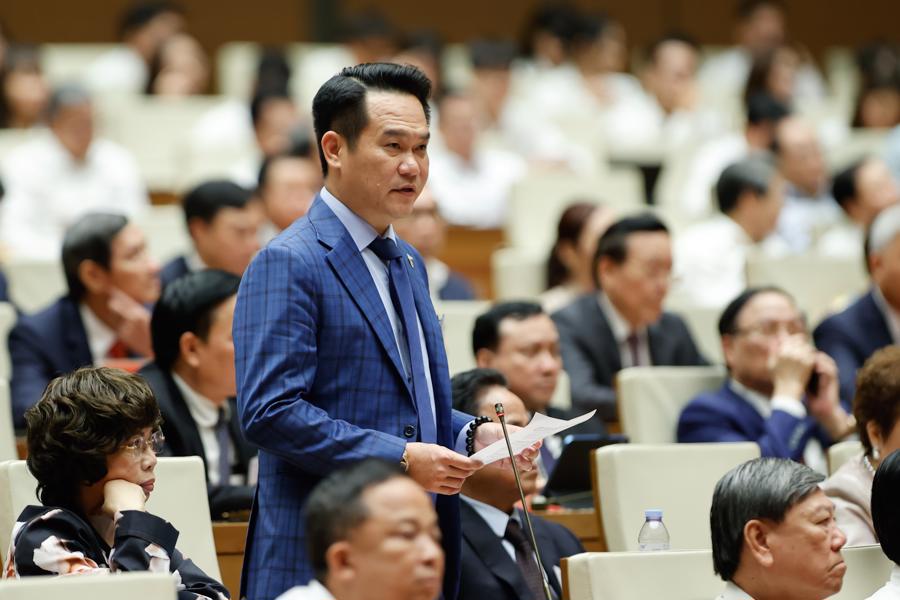
Mr. Vương Quốc Toàn, Chairman of Lan Hung Real Estate Group—a company specializing in social housing nationwide—expressed his delight at the strong interest and decisive direction of the Party and State leaders in developing the private sector.
Mr. Toàn raised a concern about the challenges faced by small and medium-sized enterprises in accessing land and capital. While there are many industrial parks, these parks only lease land from 1 hectare upwards. He suggested that localities develop industrial parks with adequate infrastructure and lease smaller land areas ranging from 1,000 to 5,000 square meters to small businesses.
In response, the Prime Minister referred to Resolution 68, which clearly states that a minimum of 20 hectares per industrial park or cluster or 5% of the total land area with invested infrastructure will be allocated for high-tech enterprises, small and medium-sized enterprises, and innovative startups. The resolution also emphasizes diversifying capital sources, with a priority given to a portion of commercial credit for private enterprises, especially small and medium-sized enterprises and auxiliary industries, and startups. The resolutions and plans of the National Assembly and the Government also include these contents, and the Government will issue a decree to further concretize access to land. Additionally, the Governor of the State Bank will issue a circular on capital sources. “The policy is very clear on these two points, and you can rest assured that there will be specific and suitable guidance in implementing them,” affirmed the Prime Minister.
He suggested that delegates and entrepreneurs continue to send written proposals to the Government and relevant agencies for thorough consideration and resolution.
“Overcoming Challenges: Unleashing the Potential of Vietnam’s Private Sector”
“During the National Conference on May 18, Prime Minister Pham Minh Chinh pointed out a slew of shortcomings hindering the development of the private sector, ranging from institutional and cognitive aspects to implementation. Despite accounting for 50% of GDP, this sector still faces a “double bind” in terms of legal framework, credit, and connectivity.”
“Plea Bargain Proposal for Businesses: Continuing Operations with a Second Chance”
The Vietnam Chamber of Commerce and Industry has proposed a plea bargain mechanism to allow entrepreneurs and businesses facing criminal charges to continue operating. This proposal aims to strike a balance between legal consequences and the continuity of business operations.

